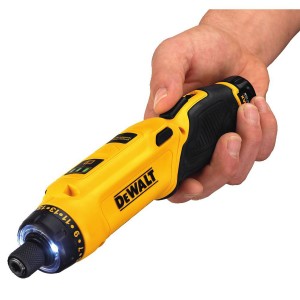DEWALT® Launches Screwdriver with Gyroscopic Technology
DEWALT DCF680 Screwdriver
Earlier this year I attended the DEWALT 2013 Media Event and I got to try this unique new screwdriver. At first I thought it might be kinda “gimmicky” but quickly realized it has huge potential. Within seconds of picking up the screwdriver you quickly learn how to control left and right rotation of the bit by simply twisting your wrist one way or the other. The controls are VERY sensitive to movement allowing the user to control speed easily.
I also have a feeling this new battery size will lead to some great new products in the near future. Read on to learn all about this cool new tool.
 TOWSON, Md. – June 3, 2013 – Today, DEWALT® announces the introduction of its new 8V MAX* Gyroscopic Screwdriver. The 8V MAX* Gyroscopic Screwdriver [DCF680] includes gyroscopic technology often found in electronic devices that has now been integrated into a professional-grade 8V MAX* screwdriver. The new 8V MAX* screwdriver is operated by gyroscopic sensors inside of the tool that sense the user’s wrist motions—right to tighten screws, left to loosen or remove screws. The DCF680 is an ideal tool for any professional user looking for a compact, portable screwdriver with precise speed control, for applications such as electrical, woodworking, HVAC, maintenance and repair, and hardware installation.
TOWSON, Md. – June 3, 2013 – Today, DEWALT® announces the introduction of its new 8V MAX* Gyroscopic Screwdriver. The 8V MAX* Gyroscopic Screwdriver [DCF680] includes gyroscopic technology often found in electronic devices that has now been integrated into a professional-grade 8V MAX* screwdriver. The new 8V MAX* screwdriver is operated by gyroscopic sensors inside of the tool that sense the user’s wrist motions—right to tighten screws, left to loosen or remove screws. The DCF680 is an ideal tool for any professional user looking for a compact, portable screwdriver with precise speed control, for applications such as electrical, woodworking, HVAC, maintenance and repair, and hardware installation.
“Although gyroscopic technology is not new to electronics, it is one of the newest forms of technologies to be used in power tools. DEWALT’s DCF680 is the first professional grade, battery-powered screwdriver to incorporate the use of gyroscopic technology to provide end user productivity,” says Jim Watson, Group Product Manager, DEWALT.
 The variable speed control sets the DCF680 gyroscopic screwdriver apart from traditional stick screwdrivers and makes applications easy, and the adjustable two-position handle allows for operation in either in-line or pistol grip. The tool is powered by an 8V MAX* lithium ion battery that provides the performance required by end users to complete jobsite applications. Users will also benefit from the LED ring light that allows illumination in confined areas, the Battery State of Charge displayed on top of the tool that notifies the user when to charge the battery, and the one-handed loading 1/4″ hex chuck that accepts 1″ bit tips. The DCF680N1 (single-battery kit) will retail for $89.97 and the DCF680N2 (two-battery kit) will retail for $99.00. Both kits come standard with a three-year limited warranty, one-year free service contract, and 90-day money-back guarantee, and will be available in August wherever DEWALT products are sold.
The variable speed control sets the DCF680 gyroscopic screwdriver apart from traditional stick screwdrivers and makes applications easy, and the adjustable two-position handle allows for operation in either in-line or pistol grip. The tool is powered by an 8V MAX* lithium ion battery that provides the performance required by end users to complete jobsite applications. Users will also benefit from the LED ring light that allows illumination in confined areas, the Battery State of Charge displayed on top of the tool that notifies the user when to charge the battery, and the one-handed loading 1/4″ hex chuck that accepts 1″ bit tips. The DCF680N1 (single-battery kit) will retail for $89.97 and the DCF680N2 (two-battery kit) will retail for $99.00. Both kits come standard with a three-year limited warranty, one-year free service contract, and 90-day money-back guarantee, and will be available in August wherever DEWALT products are sold.
* Maximum initial battery voltage (measured without a workload) is 8 volts. Nominal voltage is 7.2.
About the author
Disclosure
Product reviews on this site contain our opinion of a product or service. We will always strive for objectivity and transparency in our reviews. Our goal is to provide readers with honest, objective information based on our own experiences. We never have and never will accept payment in exchange for a positive review. Many of the products that we review are provided to us for free by a manufacturer or retailer. In some cases, we also have advertising or affiliate relationships with manufacturers and retailers of products and services we review. For additional information please visit our additional disclosure policies.






















